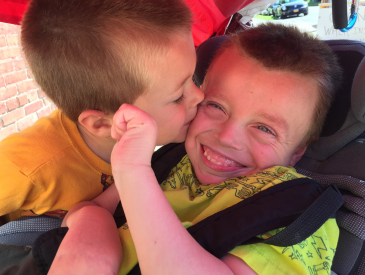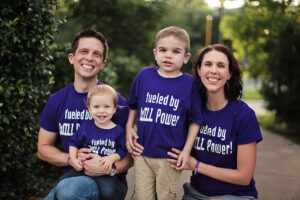Hope and Uncertainty
For many families the most daunting aspect of participating in a clinical trial is the uncertainty of the outcome. You must weigh the potential risks and benefits with very few answers readily available—because finding those answers is the goal of the trial. Your family may have to make substantial sacrifices, and there are risks and benefits associated with those too. Having made this decision, you have truly taken a leap of faith.
Clinical trial participation is a study in courage. You are participating in medical research, contributing to a greater good. Your participation helps advance science, build stronger communities, and impact the lives of children with serious illness. In other words, there are many ways that your participation, whatever the outcome of the research, can help. For all these reasons, it is important to approach, and live through, this process with hope.

Your Team:
A specialist whose aim is to improve the quality of life of their patients over the course of their illness regardless of stage, by relieving pain and other symptoms of that illness.
A professional who teaches lessons about emotions, thoughts, coping skills, facing fears, and more.
A professional who provides guidance and support.
A parenting partner and your child’s clinicians will likely be your main support through this process. A palliative specialist can help you work through your feelings about and many of the logistics of the trial. A child-life specialist will be sensitive to the needs of siblings and can advise you on how to help them navigate changes in the family’s routine as well as their own emotions. A therapist or counselor can be a helpful sounding board as you experience life during and after the trial.
Your goals and expectations for the trial may be different from your hopes, which are just as important but may shift as the trial progresses and the scientists begin to understand how the treatment is working. You may be encouraged or disappointed. It is all part of the process.
Related Resources
-
 Podcast: Dawn and Blyth – Anticipating a Clinical Trialaudio
Podcast: Dawn and Blyth – Anticipating a Clinical Trialaudio -
 Clinical Trials: Our expectations is to buy more time. (CLN2 / Batten)video
Clinical Trials: Our expectations is to buy more time. (CLN2 / Batten)video -
 Parents considering a clinical trial for their child are courageous indeed.BLOG
Parents considering a clinical trial for their child are courageous indeed.BLOG -
 The Trials of Clinical TrialsBLOG
The Trials of Clinical TrialsBLOG -
 Clinical Trials: Once treated the road ahead is unknown.video
Clinical Trials: Once treated the road ahead is unknown.video -
 The Cure We Don't WantBLOG
The Cure We Don't WantBLOG